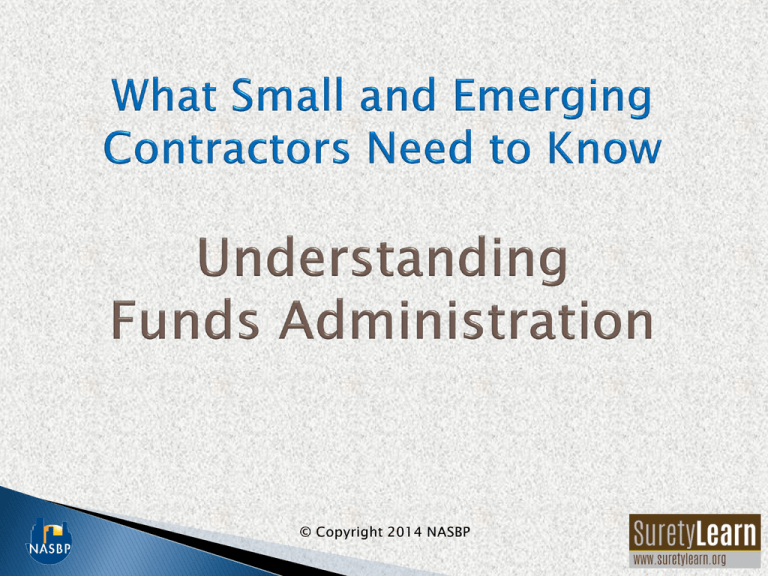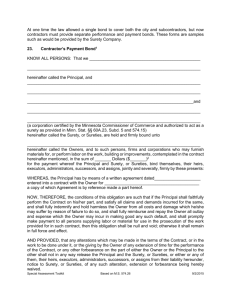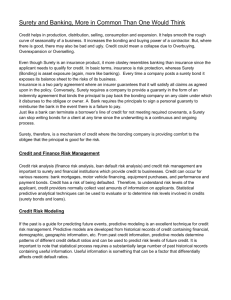Understanding Funds Administration
advertisement

• • • • Funds administration, also referred to as funds control, funds disbursement, funds management, and escrow, is a method that sureties use to offset the possibility of a claim against a payment bond. The surety either hires a third party or uses a subsidiary of the surety company to receive all billings and pay the expenses associated with the bonded contract, including labor, material, bond premium, etc. The funds administrator should have sufficient experience and insurance coverage. A surety company will require funds administration on a construction project under certain circumstances, to try to eliminate the payment risk and to reduce the performance risk as well. 2 • • • • Either a third party or the surety’s funds administration subsidiary performs the service. Once the bonded contract that will be funds administered is awarded, the funds administration/escrow service agreement is executed by the contractor/principal, the funds administrator, and the surety. There is usually a fee associated with the use of this third party. This agreement provides that the funds administrator establish a separate bank account in the contractor’s name, receive directly all contract proceeds from the owner, and disburse payments, as well as overhead and fees, during the course of the project. 3 • • • • • Most funds administrators require the contractor to obtain a letter from the project owner, called a “letter of direction,” to assure the owner’s understanding that all progress payments on the project be sent directly to the funds administrator. The funds administrator receives a job cost breakdown prior to the commencement of the work. Upon receiving each progress payment, the funds administrator will typically draft checks payable to all subcontractors, suppliers, and other vendors and will forward them to the contractor for final review and disbursement. In addition, a payment to the contractor for an agreed amount of profit and overhead will be distributed. After each draw, the funds administrator provides lien waivers and reports on the project to the surety. 4 • • • • Only incurred costs for a particular billing period and the agreed overhead and profit percentages will be paid from each progress payment. The funds administrator performs its due diligence by reviewing the requests and associated support to confirm the requested payments are proper, reasonable, and project related. Upon project completion, the contractor should have already been reimbursed all costs associated with the project as well as the profit and overhead and possibly retainage. If additional funds remain in the account at the end of the project, they will be disbursed to the contractor when the surety signs off on closing the account. 5 • • • Funds administration is a resource to enhance a small and emerging contractor’s ability to obtain surety bonds by providing them with the financial assistance necessary to learn how to properly manage construction funds and cash flow on their projects. It is a tool available for small and emerging contractors to increase their bonding capacity and to pursue contracts for which they would not ordinarily qualify for bonding capacity without the funds administration tool in place. It may also allow a contractor to negotiate better credit terms or discounts from suppliers and subcontractors. 6 • • • • Since the majority of failed projects stem from cash flow problems, mismanagement of project funds, and diversion of project funds to non-project purposes, funds administration helps surety companies mitigate their payment risk on a bonded project. Funds administration also saves on claims expense in the event of a loss by providing the surety with progress reports. If a surety can mitigate its payment risk, it is more likely to issue bonds on behalf of a contractor. The use of funds administration on a project can mean that a contractor that would otherwise not qualify for a bond can pursue certain bonded projects and learn how to manage cash flow and project funds. 7


![BKW AVRS - Section PYB (Payment Bond) [rev.9.3.14]](http://s3.studylib.net/store/data/007050752_1-7a51e90b505248a3b9e97151d2abc079-300x300.png)








